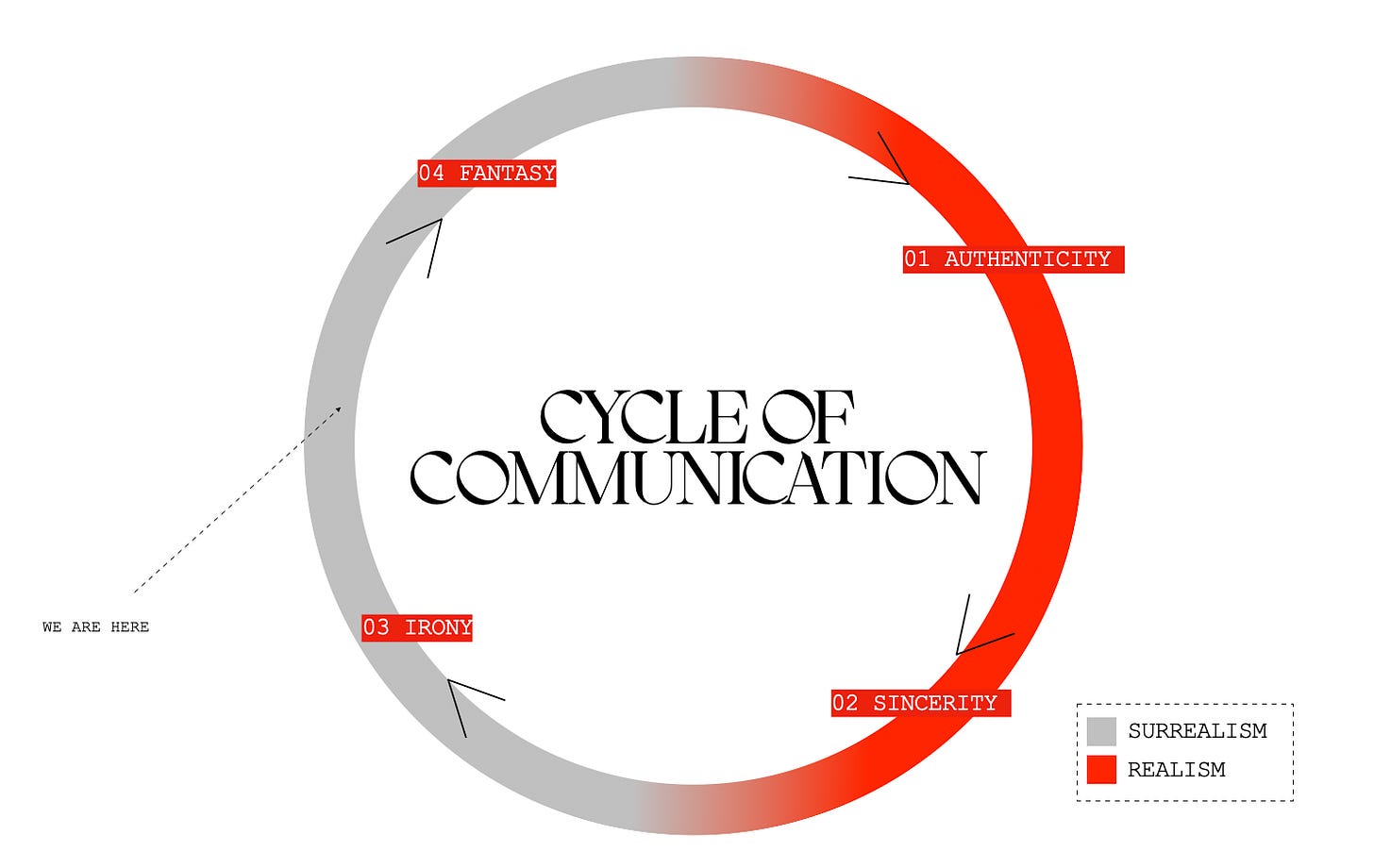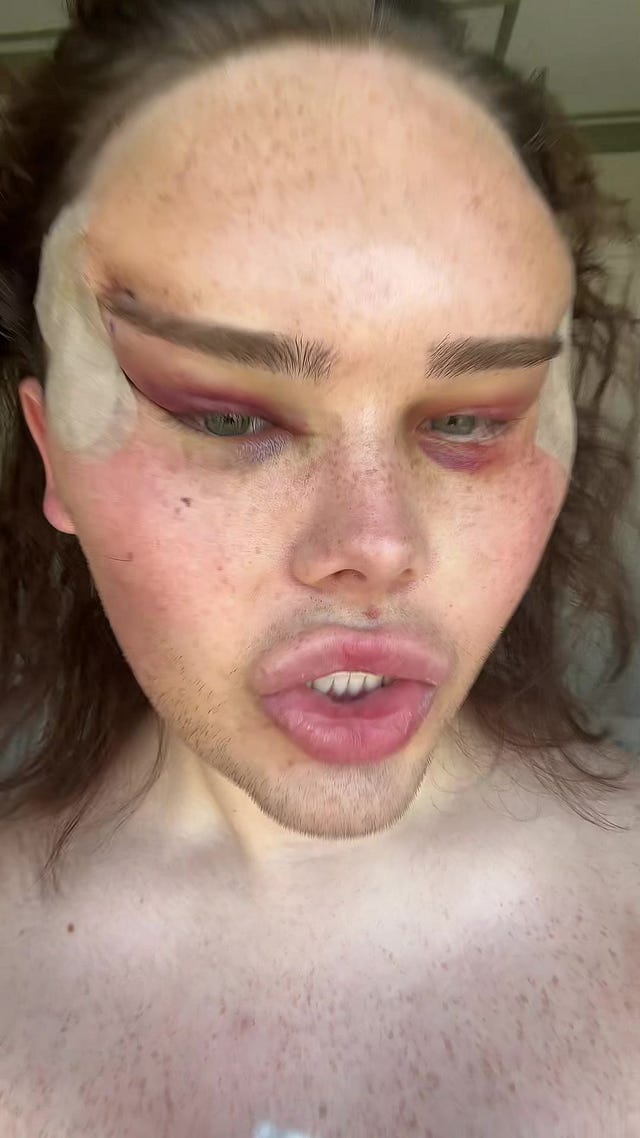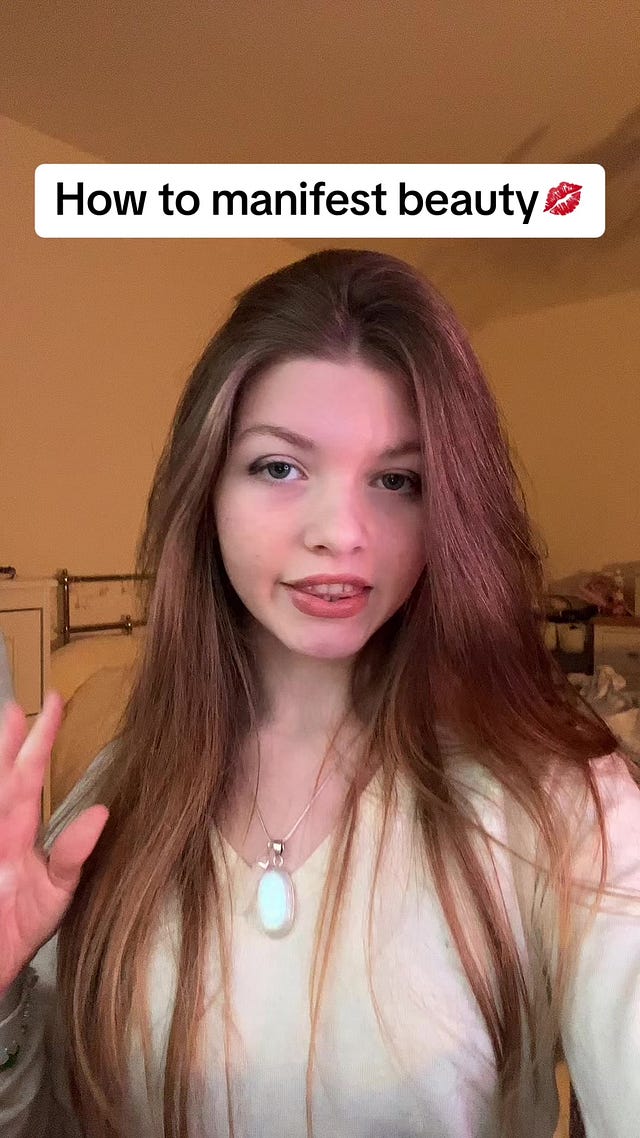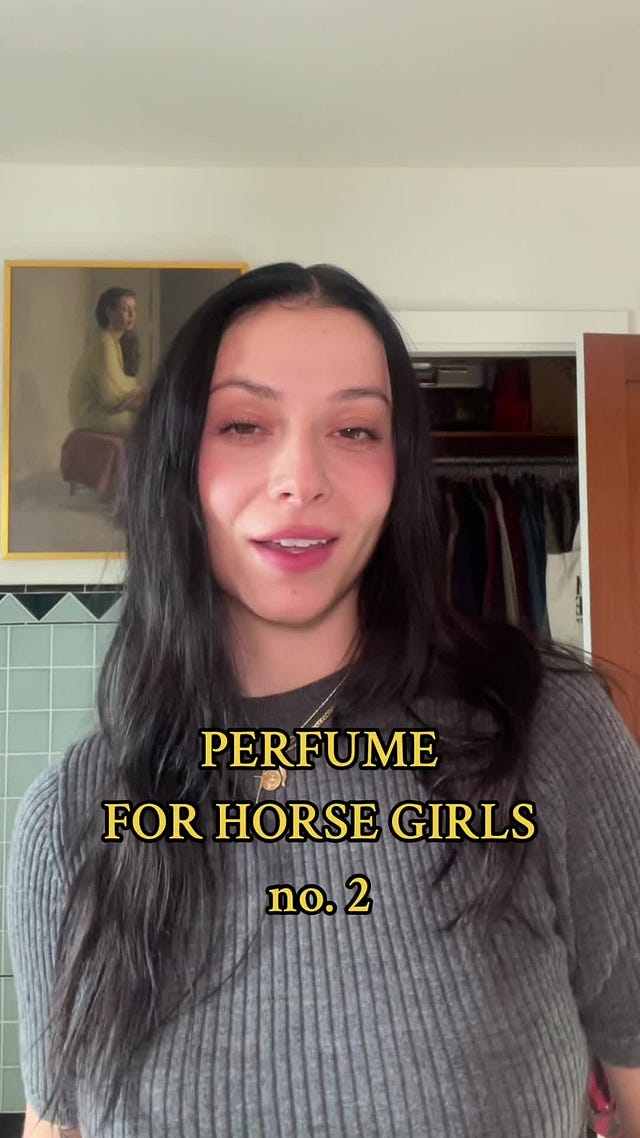What is meta-beauty?
A sneak preview of our brand new report on the shifting state of beauty and identity
What do beauty spells, looksmaxxing, psychodermatology and anthropomorphosis have in common? On first glance, perhaps not a lot. But I believe they’re all examples of theory I’ve been researching for our latest MØRNING trend report. The hot take? We’re entering a new chapter of human expression and creativity, as the digital world fractures our realities, and opens up new possibilities for existence and inspiration. We’ve called this meta-beauty.
META-BEAUTY (noun) A new era of human identity & expression, defined by an internet-fuelled period of fantasy and dreaming
How did we get here? You’ll be familiar with the several internet-fuelled mood swings we’ve moved through over the past decade. We’ve seen Sincerity and Authenticity (think MeToo, purpose marketing, body positivity), travelled through Deep Irony (the shitposting, nihilism, feigned candidness and photo dumps that dominated our feeds over the past year), and we’re now emerging on the other side, with a collective mindset shift that’s favouring dreaming over doomscrolling, and using fantasy as a way to (re)discover meaning in our reality.
We’re seeing this all over our feeds, through surrealist creative direction, increased interest in spirituality and world-building, and renewed wonder in the IRL (touch grass, etc). It’s a mindset we coined meta-fantasy in last year’s Fake vs Fake report, and we predict it’ll shape the way we think, work, and play for the couple of years ahead.
In short, meta-fantasy is touching every part of our lives, and beauty is no exception. Energised by the internet and united by social media, we’re collectively unlocking new truths and potentialities about the way we look and feel. The result is this metafied version of ourselves, an exploded definition of beauty that includes dimensions for self-expression only just being explored.
*Symptom 1: Infinite self-gaze, aka the meta-ing of our identities*
It all starts with our now-infinite self-gaze. It’s no secret that our sense of self has been fractured by the constant dialogue between ourselves, our reflections and our online identities. We’re no longer just our physical appearance and our self-expression, but the digital equivalents of the two as well.
It says a lot, I think, that five of the most famous women in mainstream pop culture today (Bella Hadid, FKA Twigs, Julia Fox, Dua Lipa and Kylie Jenner) have directly referenced their reflections or twins in their work over the past year. Self-gaze has long been a topic of interest for artists (it’s one of the most profound relationships we’ll have in this life, after all), but today it’s a defining theme of this time, one that’s overseeing a public shift from observers to artists, and meta-ing our relationships with ourselves in the process.
We’re seeing an entirely new form of beauty in selfie-production, where the nuanced elements of image making are being enlisted as valuable tools for expression. The sheer scale of selfie-making is organically generating entirely new aesthetic codes, from the trend for purposefully blurry candids to deliberately-nostalgic Instagram filters that signal an IYKYK with upcoming fashion trends. There’s even new body language, forming as a result of hyper-fast visual conversation we’re all having from selfie to selfie, giving rise to weirdcore and gen-specific poses (hello Gen-Z heart and scrunch face).

And this self-gaze hasn’t just affected the way we present online. The constant exposure to our filtered and unfiltered faces (and the filtered and unfiltered faces of others), combined with increased existential stress, has left us all hunting for control and comfort through self optimisation. Since when did surgery befores and afters become their own sub-genre of comfort content? Since when did tweakments (fox eyes, buccal fat removal) have their own trend cycle? The ubiquity of filters and surgery have made the once far-away dreams of our perfect selves and achievable, livable reality.
 Tiktok failed to load.
Tiktok failed to load.Enable 3rd party cookies or use another browser
*Symptom 2: The body as a canvas, aka the expansion of self-expression*
And while some of us dream of escaping to perfectly optimised versions of ourselves, others want to build entirely new worlds to step into. The internet has exposed us to myriad aesthetic worlds but simultaneously robbed us of the ability to engage in them IRL. We’re relentlessly romanticising subculture and nostalgia as a way to fill the void in our hearts, with cosplay as our golden ticket to the worlds we want to be part of.
Case in point: the flurry of theatrical and nostalgic beauty trends we’ve seen over recent months. There’s been recencycore, Victoriana, clowncore, the goth revival, even pirate-adjacent aesthetics: think about the popularity of Gabriette and Julia Fox, beauty icons who have captured public imagination through highly stylised aesthetic characters. Or cast your mind back to the sincerity and scale of the response to Pat McGrath’s Margiela moment, which reflected back at us our collective hunger for fantasy via history. Our appetite for world building is greater than ever, and with the internet of archive and inspiration at our fingertips, so is our ability to create the worlds we want to step into.

The wonderful Niko Haagenson, founder of Subversive Beauty, told us ‘being able to paint myself as a different person gives me the energy to keep living. Wide-spread beauty trends promote homogeneity and unfortunately bring us back to reality. The only way I am able to escape with makeup is by creating completely different identities for myself’, which says it all. Our bodies are the one canvas that we can truly own, with the power to transport us wherever we want to go.
This desire to escape via our bodies is pushing the aesthetic possibilities for the human form in every direction: ever-extreme tweakments on one hand and the complete undoing of beauty standards on the other. The mainstreaming of body modification and embellishments (tattoos, piercings, tooth decoration, nail art) show no signs of slowing, ditto the creeping influence of SFX artists like Isamaya Ffrench, Tilda Mace and Yaz XL, and the enduring virality of editorial makeup and drag creators who are doing their bit to popularise anti-beauty makeup looks. This is a movement that takes body neutrality to a new level: it isn’t self hatred, nor ambivalence, nor radical self love. Instead, it’s a curiosity and joy in all that the body can be, explored through increasingly experimental self-editing.
*Symptom 3: Dimensions of understanding, aka expanded access information = new truths*
And what about beauty beyond hair, skin and makeup? We’ve all watched the meteoric rise of wellness, though (aside from uncanny similarities between one wellness influencer and the next) all the beige OOTDs and green supplements don’t feel the most immediately surreal or fantastical.
But a different picture emerges when we add to this the rise of spirituality among young people, which has spawned trends for beauty manifestations or spell content. Or the rise in psychoactive ingredients like mushrooms or nootropics, which aim to beautify the mind, and therefore the skin.
As our access to information has expanded, so has our definitions of beauty, as we think of ourselves as existing not just in the IRL, but in the digital, spiritual, supernatural and time-defying (read: our endless obsession with anti-aging) realms too.
Yes, for some, the internet will spawn not just digital manifestations of our physical selves, but entirely new avatars through which to self-express (just look to Roblox, which has reported a 38% rise in digital avatar updates last year, up to 165 billion avatar looks).
But for others, a fractured reality is generating a deep need for tangible sensory experiences that help to enhance our experience of the real world. Perfume sales have seen a steep rise since 2022, driven by Gen Z, and I can’t help wondering if this reflects a desire for immersive sensory stimulation beyond the screen. The perfume content of today suggests that answer might be ‘yes’, with creators like Scout Dixon West leaning into the escapism of scent with highly poetic and descriptive reviews.
 Tiktok failed to load.
Tiktok failed to load.Enable 3rd party cookies or use another browser
*Symptom 4: The Beautyverse, aka a digital mirror to IRL beauty*
If you hadn’t got the picture, everything IRL has been somehow meta-ed by our very own digital mirror, the internet. And the beauty industry is no exception: for every corner of beauty IRL, there’s an expanse of digital content to match. Maybe you scroll through the world of wellness, time-travelling through futuristic beauty hacks and ancient beauty myths (and continual attempts to verify or debunk all of the above). Maybe your feed exists in the realm of editorial MUAs, using their faces as portals to new worlds. Or maybe you're deep in the alts, where small groups of users are continuing to create their own nuanced cultural codes, with beauty habits designed for seamless assimilation.
What’s the view like from where you’re standing?
Subscribe to receive the full Meta-Beauty report when it lands.
Meantime, readers, do you think your approach to beauty has become more meta over recent months? Do you think of your existence beyond the physical realm? Are you dreaming on new possibilities for the way you look? Are you using beauty to try on new characters for size, or escape your reality?
We’d love to hear your thoughts in the comments, or catch us over on Instagram. Until next time.













Wow this post was a mindfuck. I usually avoid internet related content because I’m still pretending the internet is not a universe and not really happening on some level, and so I try not to delve into it by not informing myself about it. Your notes on beauty and surgery…etc made me wonder (and to some this may be deeply offensive, for that I apologize) whether the rise of trans surgeries and what I feel is the prevalence of the trans experience today stems from this same idea on some level. I hesitate to go on because I don’t know you and I don’t want to share my full thoughts on this subject in such a public platform that anyone can read and misunderstand (but for some reason I felt it could be worthwhile to share that your writing sparked ideas and made me think about things?). Anyways thank you for sharing and educating and I guess being brave enough to tackle what I consider to be some shady? (read: dark, read: scary) aspects of the human experience :)